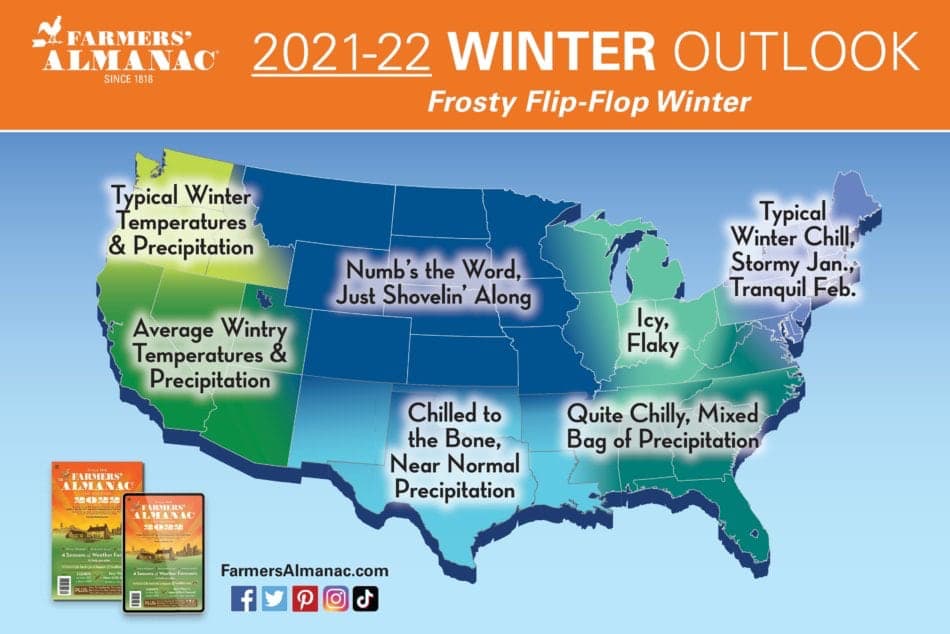
The famous Farmers’ Almanac just released their Winter Weather Outlook for 2021/22.
The Farmers’ Almanac has been in continuous publication since 1818. Today, its circulation is around 4 million copies per year.
- How did they do last year? Farmers’ Almanac Release Extended Forecast for Winter 2020-2021
How accurate is the Farmers’ Almanac? They claim it’s 80-85% accurate. Reality may be a touch different. The full forecast is below:
According to the Farmers’ Almanac’s time-tested weather formula, there will be snow, but probably not as much as snow-sport enthusiasts might dream of. On average, we’ll see near-normal amounts of the white stuff from coast to coast. However, there will be notable month-to-month variations.
As the nation is immersed in a summer wrought with weather extremes, many find their thoughts drifting to cooler temps. Right on cue, the Farmers’ Almanac has released its much-anticipated 2021-22 winter weather outlook that has its own set of extremes, earning it a “frosty flip-flop” moniker that might be a little too frosty for some and not enough flip-flop for others.
Will this winter be as snowy as last? Is Texas expected to get another snowstorm? Will winter precipitation help with the drought out West?
The Farmers’ Almanac is predicting a near-normal amount of snowfall from coast to coast; however, the unusual aspect of this winter will be the notable month-to-month variations.
January’s Flip
Winter’s chill will start gradually. In January, temperatures will start out mild for much of the country but will trend toward colder conditions during the middle to the latter part of the month. But overall, the month will be stormy, especially along the Atlantic Seaboard where an active storm track will lead to a stretch of precipitation in various forms: rain, snow, sleet, and ice.
The Great Lakes, Midwest, and Ohio Valley will have more than their fair share of cold and flaky weather in January. The Northern Plains and the Rockies will also experience Old Man Winter’s wrath with stormy weather culminating in a possible blizzard later in the month.
We are raising red flags for potent winter storms for the Great Lakes and the Northeast during the second week of January, the final week of February, and second week of March on account of bouts of heavy snow, rain, or a wintry mix of both. A possible blizzard is predicted for the Northern Plains and Rockies near the end of the third week of January.
February’s Flop
In sharp contrast, February will average out to be a much quieter month in terms of storminess across much of the nation. In the eastern third of the country, for example, we calculate that on average there will be 57% fewer days of measurable precipitation compared to January, a significant drop-off. But that doesn’t necessarily mean that storminess will be completely absent.
We’re forecasting a “winter whopper” for parts of the Northeast and Ohio Valley toward the end of February. Another “atmospheric hemorrhage” from the Pacific could lash most of the far West, with everything from strong winds to heavy rains and snow.
March’s Lion
March will see close to normal precipitation nationwide. But in a sense, March will be a microcosm of the entire winter. From start to finish, the month will be full of stretches of uneventful weather, but when it turns stormy, the precipitation will come in big doses. For the East and Midwest, for example, a late winter storm will blow in at mid-month followed by a nor’easter along the East Coast toward month’s end.
Will Another Storm Hit Texas?
The arctic outbreak in February 2021, which the Farmers’ Almanac accurately predicted, brought frigid temperatures and snow and ice to Texas and Oklahoma. The Almanac predicts similar cold and snowy conditions in late January, but fortunately, they shouldn’t be as bad as last year.
No Drought Relief Out West
The West can expect some hefty storms moving inland from the Pacific during the second week of January and the end of February, but they most likely won’t alleviate the drought conditions that area is experiencing.
Cold?
What about the cold? Winter temperatures are expected to range from near- to somewhat below normal across the eastern third of the nation, well below-normal over the Central US, and near-normal across the western US, especially in February. So if you’ve been putting off buying those sale long johns or portable hand warmers, you may want to rethink it.
Especially come March when most parts of the nation will be anxiously awaiting warmer days, the news is not all rosy: they will be few and far between. In fact, around the time of the vernal equinox, which occurs on March 20, unseasonably cold temperatures may grip many parts of the country. As we mentioned, this winter will be doing a lot of flip-flopping, with fluctuating temperatures, and March is no exception.